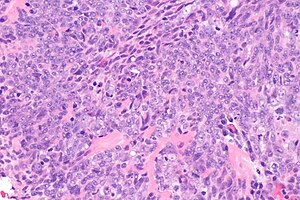Nasopharyngeal carcinoma
Jump to navigation
Jump to search
Nasopharyngeal carcinoma, abbreviated NPC, is malignant epithelial tumour of the head and neck closely related to squamous cell carcinoma.
| Nasopharyngeal carcinoma | |
|---|---|
| Diagnosis in short | |
 Nasopharyngeal carcinoma. H&E stain. | |
|
| |
| Synonyms | nasopharyngeal-type undifferentiated carcinoma, non-keratining nasopharyngeal carcinoma undifferentiated type |
|
| |
| LM | Cohesive typical (squamoid) cells (abundant dense eosinophilic cytoplasm, central nuclei +/- small/indistinct nucleoli), prominent lymphoid component |
| Subtypes | keratinizing SCC; nonkeratinizing carcinoma, differentiated; nonkeratinizing carcinoma, undifferentiated; basaloid SCC |
| LM DDx | HPV-associated head and neck squamous cell carcinoma, squamous cell carcinoma of the head and neck |
| IHC | p16 -ve, LMP-1 -ve/+ve |
| Molecular | EBER +ve |
| Site | nasopharynx - see head and neck |
|
| |
| Signs | neck mass |
| Prevalence | uncommon in West |
General
- "Nasopharyngeal carcinoma" is the name of an entity - it is not a descriptive term.
- Strong association with Epstein-Barr virus (EBV).
- Moderate risk increase for smokers.[1]
- Uncommon in the Western World[2] - endemic in the East.
Clinical:
- Neck mass - most common presentation.[2]
Note:
- A morphologically identical tumour elsewhere is called lymphoepithelioma-like carcinoma.
Gross
- Nasopharynx - as the name would suggest.
- Nasal cavity involvement - common in early disease.[3]
Microscopic
Features:[4]
- Prominent lymphoid component - key feature.
- Features of squamous cell carcinoma:
- Cohesive cells with:
- Abundant dense eosinophilic cytoplasm.
- Central nuclei +/- small/indistinct nucleoli.
- Cohesive cells with:
Note:
- May be keratinizing or nonkeratinizing[5] and the distinction is important - see classification below.
DDx:
Images
Case 1
Case 2
www
- Nasopharyngeal carcinoma - in a LN - low mag. (WP).
- Nasopharyngeal carcinoma - in a LN - high mag. (WP).
Histologic subclassification
World Health Classification (2005) for NPC:[6]
| Type | Histology | Description | EBV | Prevalence | Prognosis |
|---|---|---|---|---|---|
| 1 | keratinizing SCC | graded poorly-well-diff. | -ve | ? | bad |
| 2a | nonkeratinizing carcinoma, differentiated | well def. cell borders & tumour nest borders, mimics appearance of UCC | +ve | ? | good |
| 2b | nonkeratinizing carcinoma, undifferentiated | sheets/syncytial, vescicular nuclei, prominent nucleoli, pink cytoplasm | ? | most common | ? |
| 3 | basaloid SCC | mimics BCC - see basaloid SCC | ? | least common | ? |
How to remember KNUB:
- Keratinizing, Non-keratinizing diff., non-keratinizing Undiff., Basaloid SCC.
IHC
- p16 -ve.[7]
- LMP-1 (EBV-LMP) +ve/-ve.
Notes:
Molecular
Images
See also
References
- ↑ Xue, WQ.; Qin, HD.; Ruan, HL.; Shugart, YY.; Jia, WH. (Aug 2013). "Quantitative association of tobacco smoking with the risk of nasopharyngeal carcinoma: a comprehensive meta-analysis of studies conducted between 1979 and 2011.". Am J Epidemiol 178 (3): 325-38. doi:10.1093/aje/kws479. PMID 23785114.
- ↑ 2.0 2.1 Colaco, RJ.; Betts, G.; Donne, A.; Swindell, R.; Yap, BK.; Sykes, AJ.; Slevin, NJ.; Homer, JJ. et al. (Mar 2013). "Nasopharyngeal carcinoma: a retrospective review of demographics, treatment and patient outcome in a single centre.". Clin Oncol (R Coll Radiol) 25 (3): 171-7. doi:10.1016/j.clon.2012.10.006. PMID 23337060.
- ↑ Abdel Khalek Abdel Razek, A.; King, A. (Jan 2012). "MRI and CT of nasopharyngeal carcinoma.". AJR Am J Roentgenol 198 (1): 11-8. doi:10.2214/AJR.11.6954. PMID 22194474.
- ↑ Klatt, Edward C. (2006). Robbins and Cotran Atlas of Pathology (1st ed.). Saunders. pp. 145. ISBN 978-1416002741.
- ↑ Wenig, BM. (Dec 1999). "Nasopharyngeal carcinoma.". Ann Diagn Pathol 3 (6): 374-85. doi:10.1053/ADPA00300374. PMID 10594290.
- ↑ Humphrey, Peter A; Dehner, Louis P; Pfeifer, John D (2008). The Washington Manual of Surgical Pathology (1st ed.). Lippincott Williams & Wilkins. pp. 39. ISBN 978-0781765275.
- ↑ Gulley ML, Nicholls JM, Schneider BG, Amin MB, Ro JY, Geradts J (April 1998). "Nasopharyngeal carcinomas frequently lack the p16/MTS1 tumor suppressor protein but consistently express the retinoblastoma gene product". Am. J. Pathol. 152 (4): 865–9. PMC 1858242. PMID 9546345. https://www.ncbi.nlm.nih.gov/pmc/articles/PMC1858242/.
- ↑ 8.0 8.1 Plaza, G.; Manzanal, AI.; Fogué, L.; Santón, A.; Martínez-Montero, JC.; Bellas, C. (Mar 2002). "Association of Epstein-Barr virus and nasopharyngeal carcinoma in Caucasian patients.". Ann Otol Rhinol Laryngol 111 (3 Pt 1): 210-6. doi:10.1177/000348940211100304. PMID 11913680.
- ↑ Singhi, AD.; Califano, J.; Westra, WH. (Feb 2012). "High-risk human papillomavirus in nasopharyngeal carcinoma.". Head Neck 34 (2): 213-8. doi:10.1002/hed.21714. PMID 21484924.